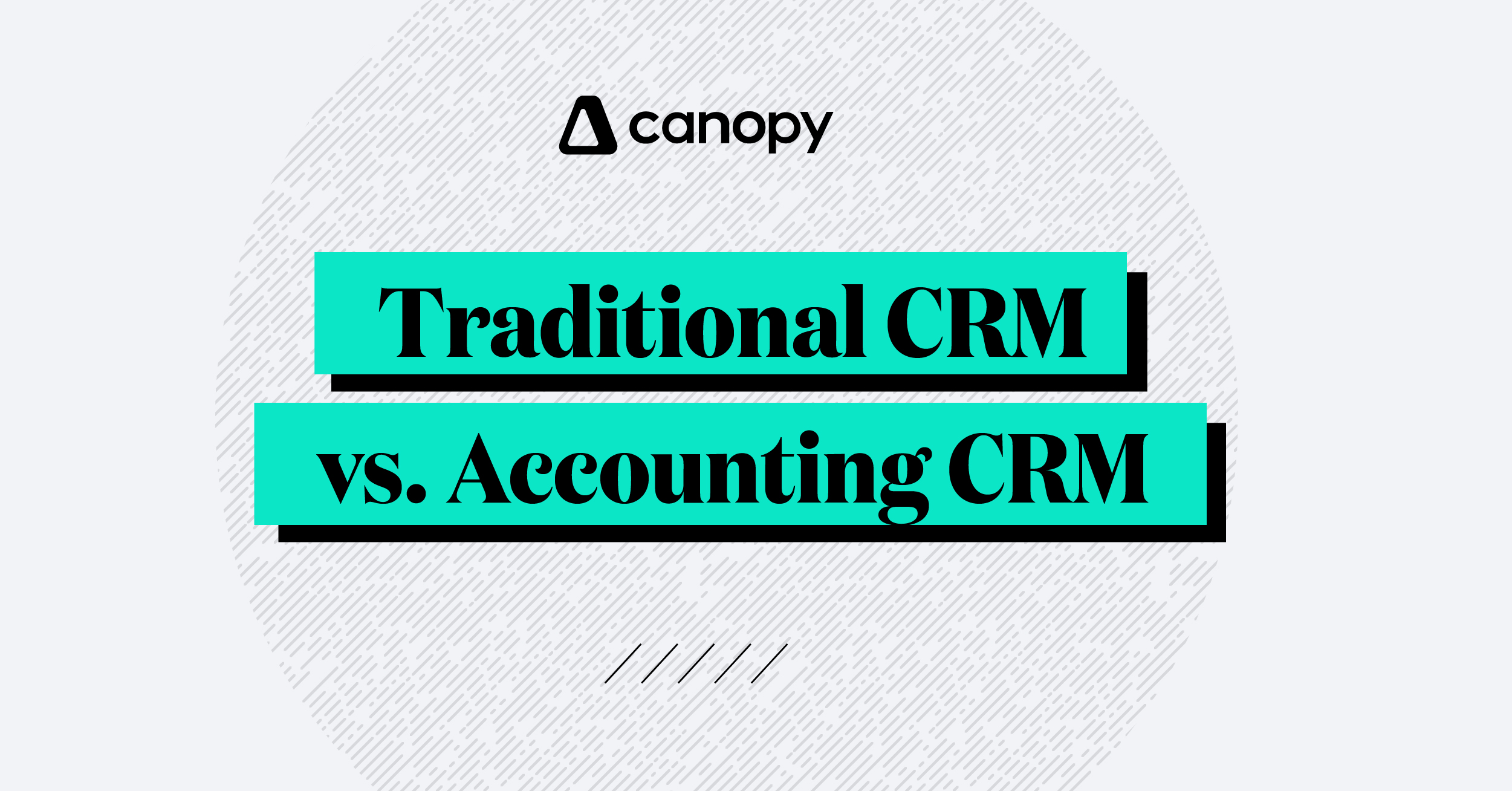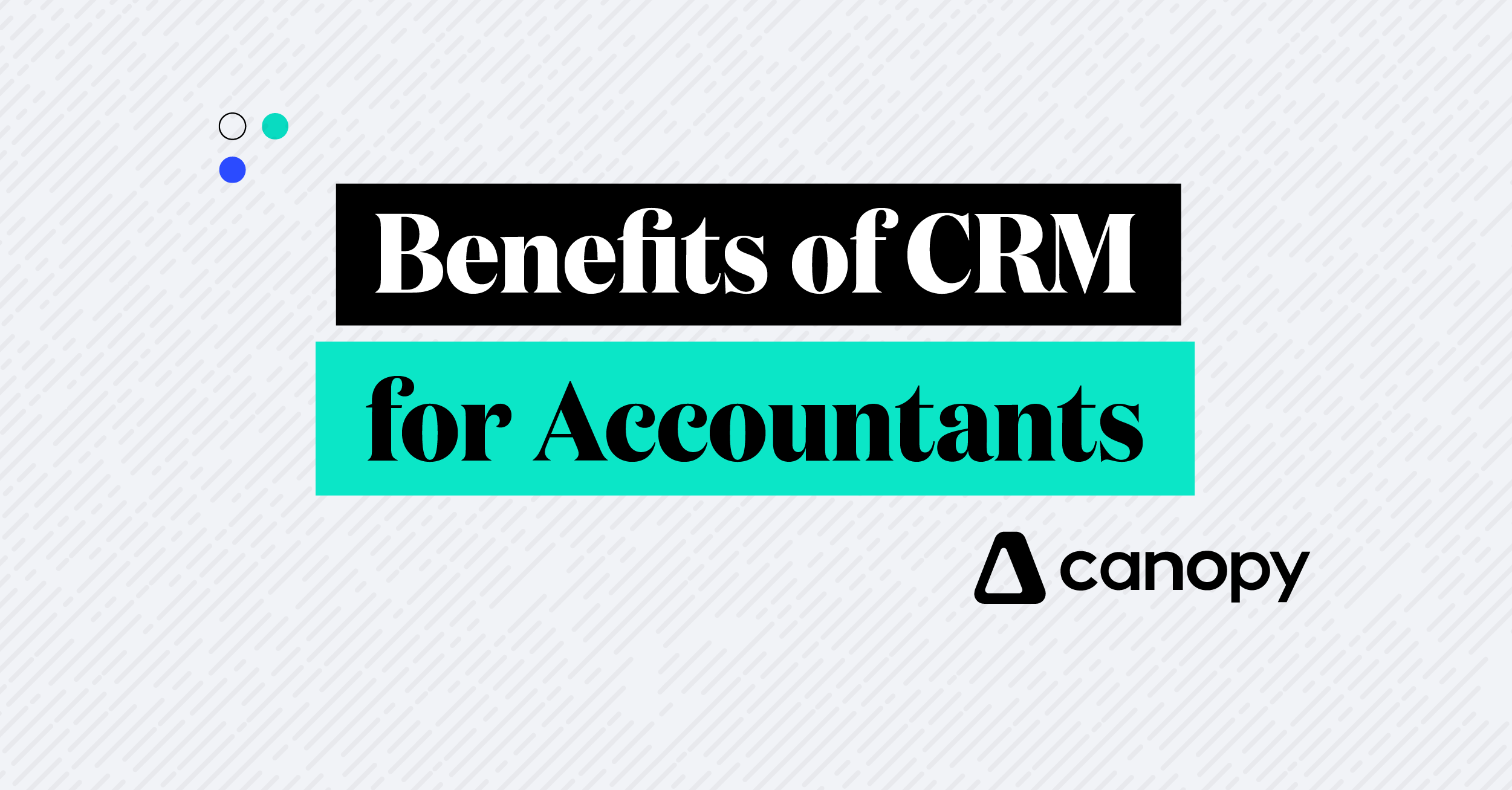Client relationship management (CRM) software helps businesses across all industries manage client communications throughout the service lifecycle. Small-to-medium-sized businesses (SMBs), especially, will seek out free options to get the basic necessities from a well-regarded platform.
However, specialized services like those provided by accounting firms have unique needs. When these firms seek free accounting CRM software solutions, some of the most important features aren't included or are limited in use, which can be detrimental to the practice.
This article examines whether free accounting CRM software options are sufficient, whether the drawbacks are worth the risk, and the importance of choosing a platform tailored specifically for accountants.
The Benefits of Free Accounting CRM Software
The allure of free CRM software for accountants is easy to understand. Small and medium-sized accounting firms must be frugal and look for ways to keep operational costs down. With numerous CRM options on the market, many platforms offer free versions promising a significant selection of premium features.
Review some benefits of no-cost platforms.
Cost Efficiency
Many small firms may look at the cost of CRMs specialized for accountants and reason that without a free option, they simply have to forego the luxury of using a CRM altogether. They figure limited options and functionality are better than nothing.
Solo practitioners and small firms may see options for upgrade paths from free versions as a way to gain enough benefit to buy the next tier-level version eventually after gaining some of the efficiencies CRMs can provide.
Basic Client Management
Free CRM accounting software typically offers basic client management features, serving as a centralized platform for storing and tracking essential client information. This functionality forms the core of any CRM system and can significantly enhance an accounting firm's ability to manage client relationships effectively.
Even free CRM options can provide valuable client communication management features, allowing the practice to store and track contact details like names, addresses, phone numbers, and email addresses.
Communication Tracking
A free CRM application can provide a centralized repository for individual clients’ emails, calls, and meeting histories. Logging details about correspondence dates and critical points discussed helps practices retrieve relevant data for service needs and boost client satisfaction.
Some free versions offer more extensive features related to tracking and data, including the number of contacts, fields, sorting options, and even basic analytics.
Simple Automation
Free CRM accounting software often includes basic automation features that can significantly enhance productivity and ensure consistent client follow-up. While these tools are not as advanced as those found in paid versions, they can still provide substantial benefits in managing client relationships and tasks.
A free platform may also include automation tools to set reminder alerts, create automated tasks tied to meetings or phone calls, simplify email automation routines, and schedule calendar events. Even basic automation features like this can be useful for general communications. For firms with communication needs struggling with separate platforms across various aspects of their operations, a limited free CRM is better than no centralized communications at all.
Every successful practice needs to grow, and the slight step-up to a basic, free option leads to a serious bottleneck across all operations. When it’s time to expand, there’s a good chance the platform lacks the advanced accounting-specific tasks required to scale.
The Drawbacks of Free CRM Software
While no one can really complain about what they paid for a free application, the downsides can be more severe than they might appear at first glance.
The Allure of “Freemium” CRMs
A basic free software version is often an entry point to tiered paid options. This freemium approach lets customers gauge the best balance between cost and features on the way up.
The real issue is that users are deeply tied to the solutions offered and find that premium solutions don’t integrate well. The free version never provides the opportunity to experience the advanced features offered in the paid versions. This problem leads to lost time and the need to migrate to a better platform.
A better solution might be the "register and try the full version for 15 days for free" option, which lets you get familiar with everything offered.
Limited Functionality
The lack of advanced features like analytics, reporting, automated tasks, and vital integrations with accounting platforms can leave your business functions disconnected. Partners depend on integrated communications but have no way to connect them to important accounting data, which is their core business. This disconnect can accentuate the inefficiencies that were already evident rather than reduce their impact.
Scaling Issues
To get the best from a CRM platform—free or not—firms need to be able to connect the dots between various points in their workflow and between different members of the practice. Without customized automation and centralized data that connects the clients to the corresponding accounting data, scaling takes double the effort and double the resources.
Capped Storage
Data takes up storage space. In the free version, you’ll continue to creep closer to that storage limit as your interactions with long-term clients increase.
Multiply this by the number of contacts as you add new clients, added to old clients you no longer represent, but whose data you need to keep backed up. You may find yourself choosing the lowest-paid tier while still not gaining any of the advanced features you need.
Contact and User Limits
The number of contacts is a ceiling on how much your practice can scale, as is the standard free limitation on the number of simultaneous users logged in. If you plan to grow your practice, you won’t achieve much success without paying for CRM.
Limited Support
Premium software often comes with personalized support, whereas free software usually entails sluggish email replies and community-driven support forums. If your practice has an urgent issue, expect to find the solution on your own.
Ultimately, free CRM software for accounting isn’t truly specialized for accounting in its basic form because all of the powerful features that align CRM and accounting data reside behind the tiered paywall.
The Case for a Premium CRM
Accounting firms face industry-specific challenges that require a CRM solution focused on extensive yet highly specific solutions in client data management. Communications extend to the inner details of bookkeeping, tax resolution and filing, document storage, and dozens of interlocking facets of an accounting practice.
Without a holistic approach to CRM, accountants can never scale to their full potential. A premium accounting CRM solution includes the following:
- Practice-specific tax resolution tools
- Workflow automation
- Deadline tracking
- Real-time data tracking and reporting
- Integrated billing and invoicing
- Time tracking
- Unlimited storage and client contacts
- Industry-specific security and compliance
Accountants don’t just need to centralize communications—they also need client data within the same path of communication: streamlined and centralized. Bringing all vital data together under a single platform removes barriers that limit how partners share tasks and information with one another as well. A CRM focused solely on the needs of accountants solves these challenges.
Only a premium CRM platform that handles the unique needs of an accounting firm can effectively integrate detailed financial forecasting, automation, and client-specific accounting data and connect it to all aspects of individualized communications.
When to Transition from Free to Premium CRM
When a firm's leaders carefully weigh the pros and cons of a free CRM solution, considering the benefits and the reality of limited growth potential, the challenge is identifying when it’s time to transition to a more permanent, scalable solution. One vital indicator is realizing the need to track projects and deadlines in an integrated manner.
Balancing numerous clients, maintaining compliance, and keeping the details from falling between the cracks is complex enough. Automating workflows and everyday tasks could help if all the data points were connected, but they’re not. The only way to improve these inefficiencies is to switch to a premium CRM built to solve your unique challenges.
Signs That It’s Time for a Paid CRM
When partners are still hopping from one specialized application to another, managing segmented aspects of their business, they are experiencing the reality of what’s missing in free CRM options. These are some indicators of a serious bottleneck:
Difficulty Tracking Projects and Deadlines
Free accounting CRM software lacks important integrated management features for filing deadlines, audit timelines, and client milestones. A lack of features or limited visibility can cause your firm to miss critical dates or fail to track compliance-related data. Missing these critical details can cause clients to believe your firm is disorganized, eroding trust.
Team Using Disconnected Tools
Without robust integration options, free CRM software for accountants may not provide your team with insights that can only come from bringing client data from payroll, budgets, and other data stored in accounting platforms. Scattered information makes it hard to see the client’s experience holistically.
This issue results in a siloed approach to client management, where partners work with different platforms to manage communications, calendars, and bookkeeping.
Need for Accounting-Specific Features
For accounting, free CRM software is incomplete without industry-specific features like:
- Invoicing
- Financial reporting
- Real-time financial forecasting
- Streamlined billing
- Tax document management
- Accounting-specific compliance management
Accounting data alone lacks unique details about clients that stem from CRM communications.
A CRM alone cannot analyze metrics or report on the status of accounting details throughout the year.
Stifled Plans for Scaling the Firm
As firms grow, managing client relationships, projects, and data becomes exponentially more complex. Free CRM options lack the scalability and advanced features necessary to support a growing practice.
Is Free Accounting CRM Software Worth It?
Very few scenarios exist where a free CRM solution will work for accountants. Is it an impressive step up from managing email, text, calls, and scheduling in separate applications while the accounting software is disconnected from them all? Certainly.
But it’s like focusing on a tiny segment of the efficiencies a practice needs, knowing there is no true path forward without complete integration of multiple other accounting tools. Any firm serious about growth, efficiency, and providing truly world-class service to clients will need a CRM custom-tailored to the needs of its accountants.
Quick recap: With Canopy, here’s what a professional CRM for accountants looks like:
- Secure cloud-based document storage
- Time tracking and billing
- Centralized client management
- Robust integrations
- Automated tasks
- Powerful communication tools
- A feature-rich client portal
- Automated workflows
- Numerous accounting-specific templates
- Reporting and analytics
- Role-based permissions for security
The best kind of “free” for accounting firms seeking excellence from their accounting CRM platform is a free trial of the complete, premium platform.
If you’re ready to enjoy the efficiency of customized dashboards, centralized client data, detailed reporting, bulk actions, and integrated client communication, try Canopy’s CRM platform for free today!

Chris is a content manager for Canopy, joining the team with a combined eight years of experience as a copywriter, editor-in-chief, and content marketer. He's a skilled wordsmith and strategic thinker who shapes brand identity through compelling content and fosters a collaborative and innovative environment. With a passion for storytelling and a dedication to excellence, he is a driving force behind any company's success in content marketing. Champion of the Oxford comma.
READ MORE BY Chris






Get Our Latest Updates and News by Subscribing.
Join our email list for offers, and industry leading articles and content.